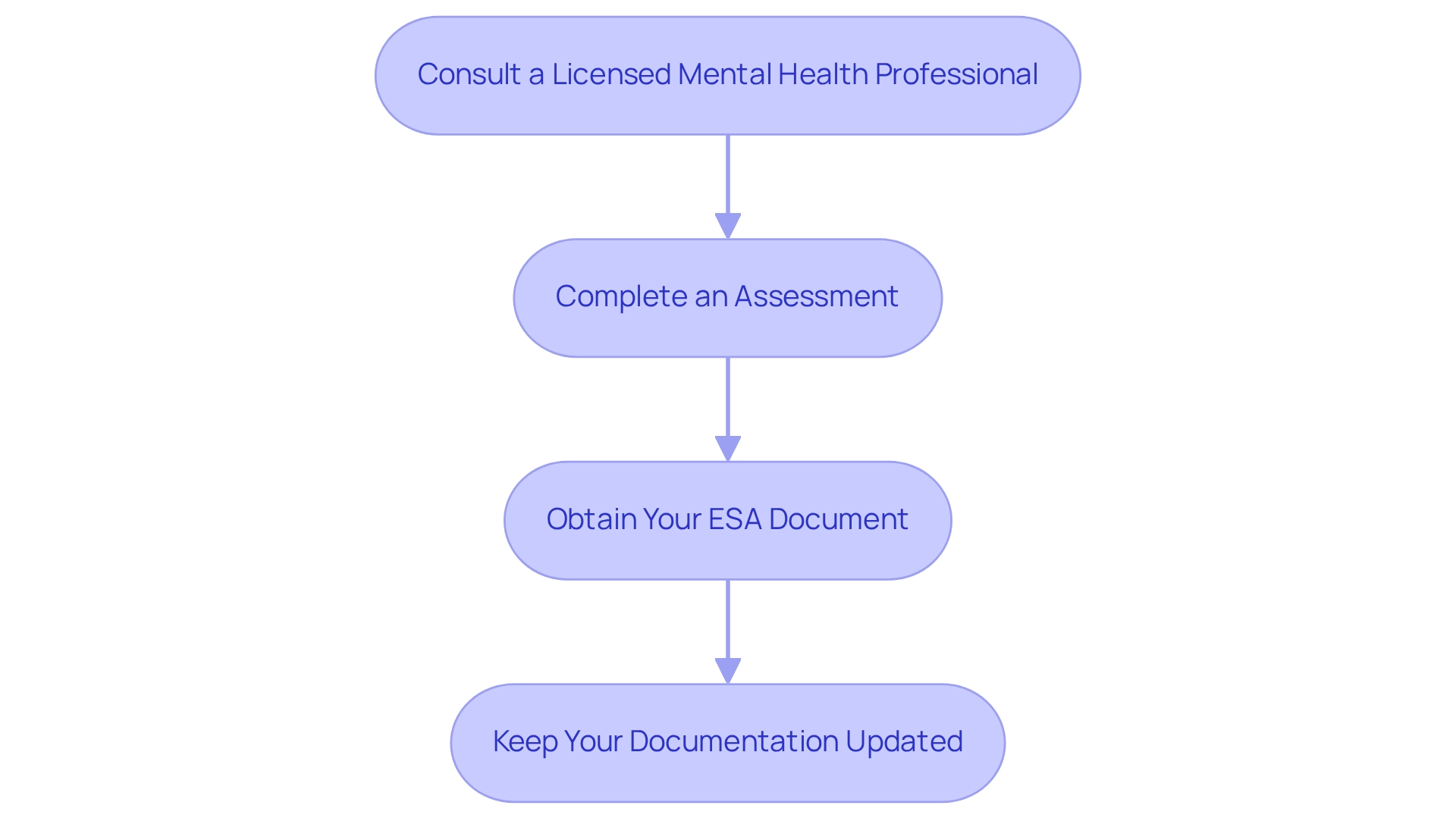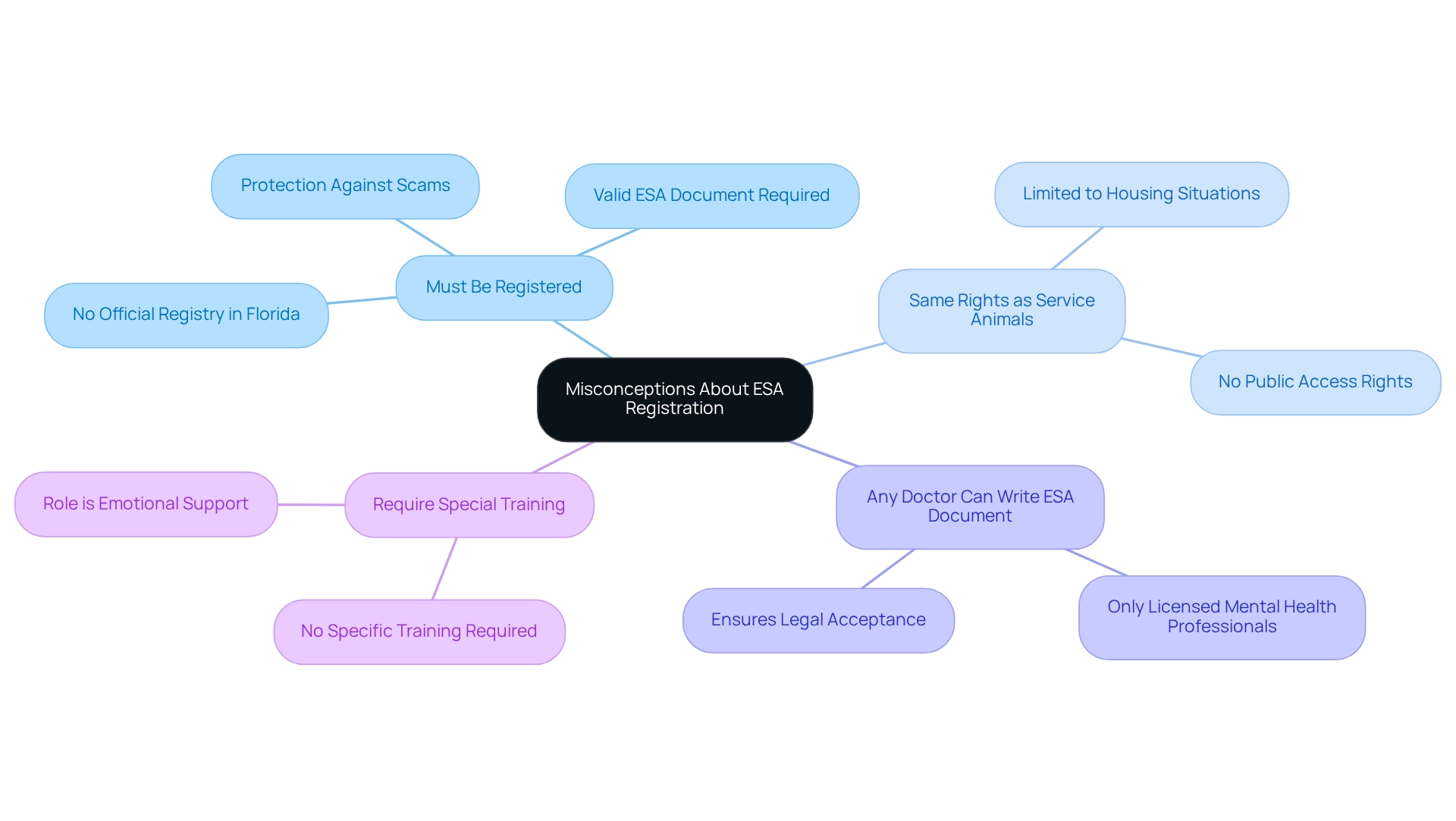

Emotional Support Animal Registration Florida: A Step-by-Step Guide
by Lena Park
Last updated: July 17, 2025
Verified and Approved by:
Angela Morris,
MSW, LCSW
Fact Checked

Overview
This article offers a heartfelt step-by-step guide for obtaining emotional support animal registration in Florida, recognizing the significance of securing a legitimate ESA letter from a licensed mental health professional. It compassionately outlines the legal protections granted to ESA owners under the Fair Housing Act, gently clarifying common misconceptions about ESA rights and the registration process. This ensures that individuals are well-informed about their rights and responsibilities regarding emotional support animals, fostering a sense of empowerment and understanding.
Introduction
In the realm of mental health and emotional well-being, Emotional Support Animals (ESAs) have emerged as crucial companions for those facing psychological challenges. For many, the journey through mental health struggles can feel isolating and overwhelming.
In Florida, the legal landscape surrounding ESAs offers a supportive yet complex framework, allowing individuals the opportunity to live with their furry friends in housing that may otherwise prohibit pets. However, navigating the nuances of ESA rights and the process for obtaining the necessary documentation can be daunting.
It’s essential to address the common misconceptions that often cloud this topic, as understanding these aspects is vital for both current and prospective ESA owners. This article delves into the legal status of ESAs in Florida, the steps to secure an ESA letter, and the protections afforded to ESA owners.
By exploring these elements, we aim to ensure a comprehensive understanding of this vital support system, reassuring you that help and companionship are available on your journey.
Define Emotional Support Animals and Their Legal Status in Florida
Emotional Support Animals serve as vital companions for individuals grappling with emotional or psychological challenges, offering comfort and assistance without the need for specialized training. In Florida, emotional support animal registration Florida recognizes emotional support animals under the Fair Housing Act (FHA), allowing individuals with disabilities to live with their emotional support animals in homes that typically restrict pets. However, it’s important to understand that emotional support animal registration Florida does not confer the same public access rights as service animals, which are specifically trained to perform certain tasks.
To validate the need for an ESA legally, one must obtain a legitimate ESA document from a licensed mental health professional. This document is crucial for ensuring compliance with housing regulations and navigating pet restrictions. Recent updates to emotional support animal registration Florida laws underscore the importance of this documentation; landlords can only deny an ESA if they can demonstrate that accommodating the animal would result in property damage, impose an undue financial burden, or pose a risk to the safety of other tenants.
At Wellness Wag, we provide accessible consultations to help individuals understand the eligibility criteria for obtaining an emotional support animal registration letter in Florida, including age, legal capacity, and local regulations. Did you know that individuals with strong attachments to their pets experience 25% lower anxiety levels compared to those without such bonds? This statistic highlights the therapeutic benefits of emotional support animals, as many owners report increased motivation and reduced feelings of hopelessness through their daily interactions with their companion animals.
A comprehensive survey involving 1,500 participants revealed the positive mental health outcomes associated with ESA ownership, offering valuable insights into the demographics of ESA owners and their experiences, especially in light of the emotional support animal registration in Florida. As we approach 2025 and witness the continued development of the legal recognition of ESAs in Florida, reinforcing the necessity for proper documentation and a clear understanding of one’s rights under the FHA. This legal framework not only aids individuals in securing housing but also nurtures their emotional well-being through the companionship of their animals.
If you have any questions or concerns about this process, please refer to our FAQs or reach out to us directly. At Wellness Wag, we are committed to empowering individuals by providing accessible and reliable consultations, ensuring that everyone can experience the life-changing benefits of ESA companionship.
Outline the Process for Obtaining an ESA Letter in Florida
Obtaining an emotional support animal registration Florida can be a crucial step towards emotional well-being. Here’s how to navigate this process with care:
- Consult a Licensed Mental Health Professional: Begin by scheduling an appointment with a licensed therapist, psychologist, or psychiatrist. This professional will evaluate your mental health needs, ensuring they are licensed in Florida to provide a valid ESA letter. It’s important to find someone you feel comfortable with, as this connection can significantly impact your experience.
- Complete an Assessment: During your consultation, be open to discussing your emotional or psychological condition. Share how an ESA can support you in your journey toward healing. This assessment is vital for the mental health professional to understand your unique situation and determine if emotional support animal registration Florida is necessary for your well-being.
- Obtain Your ESA Document: If deemed essential, the mental health expert will provide you with an ESA document. This document should include their license number, signature, and contact information, serving as your official proof when presenting to landlords or airlines.
- Keep Your Documentation Updated: It’s advisable to renew your ESA letter annually to maintain its validity with housing providers. Regular updates are important, especially if your mental health professional recommends ongoing support, such as emotional support animal registration Florida, to ensure that you have the proper documentation to advocate for your rights under the Fair Housing Act and Air Carrier Access Act. This allows your emotional support animal to accompany you in various settings, providing the comfort and companionship that can make a significant difference in your life.

Explain Legal Protections for ESA Owners in Housing and Travel
In Florida, individuals who rely on Emotional Support Animals (ESAs) often find themselves navigating a complex landscape of housing regulations related to emotional support animal registration Florida. The Fair Housing Act provides essential safeguards, mandating that landlords offer reasonable accommodations for tenants with these cherished companions. This legislation not only prohibits landlords from imposing additional fees or deposits for emotional support animals but also protects ESA owners from being denied housing solely based on a no-pets policy. However, it’s important for ESA owners to present a valid ESA letter to their landlord, ensuring that their rights are upheld and that they feel secure in their living situation.
As we explore the realm of travel, the changes in airline policies can feel daunting. Recent updates indicate that airlines are no longer required to treat emotional support animals in the same manner as service animals. This shift means that ESA owners must take the time to verify their airline’s specific policies regarding pet travel. It’s crucial to ensure they possess the necessary documentation for their ESA when planning to fly, allowing for a smoother travel experience.
Legal frameworks in Florida also remind us that while ESA owners have rights, they also carry responsibilities. ESA owners are accountable for any damage their animals may cause, which is vital in maintaining a harmonious living environment. This balance of rights and responsibilities is essential in protecting the emotional support that these animals provide. Understanding these legal protections can empower ESA owners as they navigate housing and travel situations in Florida, highlighting the significance of emotional support animal registration Florida in their lives.
Clarify Common Misconceptions About ESA Registration and Usage
Many individuals face emotional challenges, and misconceptions surrounding emotional support animal registration Florida can exacerbate their struggles, especially in Florida. It’s important to address these myths with compassion and clarity.
Myth: Emotional Support Animals Must Be Registered: A common belief is that emotional support animals need to be registered, but this is not true. There is no official registry for ESAs in Florida. The only requirement is a valid ESA document from a licensed mental health professional. Unfortunately, many people mistakenly believe that emotional support animal registration Florida is necessary, leading to confusion and misinformation. Wellness Wag emphasizes that the essential documentation for emotional support animal registration Florida is simply this letter, helping to protect individuals from scams and misinformation.
Myth: Emotional Support Animals Have the Same Rights as Service Animals: It’s crucial to understand that emotional support animals do not have the same access rights as service animals. Their recognition is primarily limited to housing situations, where they provide vital emotional support. This distinction is important for pet owners who wish to benefit from having an ESA.
Myth: Any Doctor Can Write an ESA Document: Only licensed mental health professionals can issue legitimate ESA documents. General practitioners or non-licensed individuals are not authorized to provide valid documentation, which is essential for ensuring that the letter is accepted legally. This requirement ensures that the ESA letter meets the necessary standards.
Myth: Emotional Support Animals Require Special Training: Unlike service animals, emotional support animals are not required to undergo specific training. Their primary role is to provide emotional support, making them accessible to individuals seeking companionship. This key difference sets emotional support animals apart from service dogs, which are trained to perform specific tasks.
Understanding these misconceptions is vital for pet owners. For instance, many mistakenly believe that certification or vests are necessary for emotional support animals, which is not the case. As Wellness Wag points out, “Fraudulent websites often misuse this idea to mislead pet owners, promising legal benefits that don’t exist.” Furthermore, while some may think that emotional support animals must wear vests or be certified, this is not a legal requirement. Recognizing that only a document from a licensed mental health professional is needed for emotional support animal registration Florida helps clarify the legal distinctions governing ESAs.
Wellness Wag offers a streamlined process for obtaining ESA letters, ensuring that individuals can access the support they need with ease. As the landscape of emotional support continues to evolve, it is essential to stay informed and recognize these distinctions, allowing individuals to feel empowered and supported on their journey.

Conclusion
Emotional Support Animals are not just companions; they play a vital role in enhancing the mental well-being of individuals facing emotional and psychological challenges. In Florida, the legal framework surrounding ESAs underscores their importance by allowing individuals to live with their beloved companions in housing that may otherwise restrict pets. However, navigating the complexities of ESA rights is essential, including understanding the necessity of a legitimate ESA letter from a licensed mental health professional. This letter serves as the cornerstone of legal protection for ESA owners, ensuring they can access the support they need.
Obtaining an ESA letter is a straightforward yet crucial process. It involves consulting a licensed mental health professional, undergoing an assessment, and securing the proper documentation to advocate for one’s rights under the Fair Housing Act. This process not only legitimizes the emotional support provided by these animals but also empowers individuals to maintain their mental health in various settings. Have you considered how much easier life could be with the right support?
Despite the significant benefits, misconceptions about ESAs persist, often leading to confusion. Clarifying these myths—such as the belief that ESAs must be registered or have the same rights as service animals—is vital for current and prospective ESA owners. Understanding the legal protections afforded to ESA owners in housing and travel situations is equally important, ensuring that individuals can enjoy the companionship of their animals without unnecessary barriers.
Ultimately, Emotional Support Animals are essential partners in the journey toward emotional stability. By staying informed about the legalities and processes involved, individuals can fully embrace the companionship of their ESAs. This fosters a supportive environment that enhances their quality of life. Remember, you are not alone on this journey; support is available, and your ESA can be a crucial part of your path to healing.
Frequently Asked Questions
What are Emotional Support Animals (ESAs)?
Emotional Support Animals serve as vital companions for individuals dealing with emotional or psychological challenges, providing comfort and assistance without needing specialized training.
How does emotional support animal registration work in Florida?
In Florida, emotional support animal registration recognizes ESAs under the Fair Housing Act (FHA), allowing individuals with disabilities to live with their ESAs in homes that usually restrict pets.
Do Emotional Support Animals have the same rights as service animals?
No, emotional support animals do not have the same public access rights as service animals, which are specifically trained to perform certain tasks.
How can one legally validate the need for an Emotional Support Animal?
To legally validate the need for an ESA, one must obtain a legitimate ESA document from a licensed mental health professional, which is essential for compliance with housing regulations.
What recent updates have been made regarding emotional support animal registration in Florida?
Recent updates emphasize the importance of having proper documentation; landlords can only deny an ESA if they can prove that accommodating the animal would cause property damage, impose an undue financial burden, or pose a safety risk to other tenants.
What support does Wellness Wag provide regarding ESAs?
Wellness Wag offers accessible consultations to help individuals understand the eligibility criteria for obtaining an ESA registration letter, including age, legal capacity, and local regulations.
What are some mental health benefits associated with owning an Emotional Support Animal?
Individuals with strong attachments to their pets experience 25% lower anxiety levels, and many ESA owners report increased motivation and reduced feelings of hopelessness through their interactions with their animals.
What insights have been gained from surveys regarding ESA ownership?
A comprehensive survey involving 1,500 participants revealed positive mental health outcomes associated with ESA ownership, providing valuable insights into the demographics of ESA owners and their experiences.
Why is proper documentation important for ESAs?
Proper documentation is crucial for ensuring compliance with housing laws and understanding one’s rights under the FHA, which helps individuals secure housing and supports their emotional well-being through companionship.
How can individuals get more information or assistance regarding ESAs?
Individuals can refer to the FAQs provided by Wellness Wag or reach out directly for consultations to learn more about the process and benefits of Emotional Support Animals.
Certify Your Emotional Support Animal Today

Why You Can Rely on Us?
At Wellness Wag, we believe your pet deserves care rooted in both science and compassion. Each article is carefully researched, written in clear language for pet owners, and then reviewed by qualified professionals to ensure the information is evidence-based, current, and practical for real-life care. Our goal is to help you feel confident in making informed decisions about your pet’s health and well-being.
Reviewed by
Angela Morris, MSW, LCSW
Angela is a licensed clinical social worker with 20 years of experience in patient advocacy and community mental health. She has assisted numerous clients with ESA evaluations and brings a deep understanding of disability accommodations, ensuring that all information is accurate, supportive, and practical.

Written by :
Lena Park
Last Updated :
July 17, 2025












